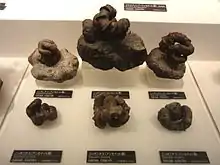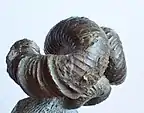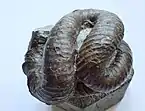Nipponites
Nipponites is an extinct genus of heteromorph ammonites. The shells of Nipponites (primarily N. mirabilis) form "ox-bow" bends, resulting in some of the most bizarre shapes seen among ammonites.
| Nipponites | |
|---|---|
 | |
| Fossils of Nipponites mirabilis from an exhibit at the National Museum of Nature and Science, Tokyo, Japan | |
| Scientific classification | |
| Kingdom: | |
| Phylum: | |
| Class: | |
| Subclass: | |
| Order: | |
| Suborder: | |
| Superfamily: | |
| Family: | |
| Genus: | Nipponites Yabe, 1904 |
| Species | |
| |
The ecology of Nipponites, as with many other nostoceratids, is subject to much speculation.
Distribution
Fossils of most species are found primarily in Upper Cretaceous strata of Japan. N. mirabilis is found in Coniacian-aged strata of Japan and possibly Turonian-aged strata in Madagascar.[2] N. bacchus is found in Upper Cretaceous Hokkaido. Two species are found exclusively outside Japan, N. sachalinensis, which is found in Upper Cretaceous strata of Sakhalin island, and Kamchatka peninsula,[3] and N. occidentalis, which is known from two shells found in the Turonian-aged Hornbrook Formation of Southern Oregon.[4]
Image gallery
 N. mirabilis
N. mirabilis N. mirabilis
N. mirabilis N. mirabilis
N. mirabilis
References
- Notes
- Sepkoski, Jack (2002). "Sepkoski's Online Genus Database". Retrieved 2014-05-28.
- Makhon ha-geʹologi (Israel) (1981). Geological Survey Current Research. Ministry of Commerce and Industry, Geological Survey of Israel.
- Shigeta, Yasunari, and Haruyoshi Maeda. "Yezo Group research in Sakhalin—a historical review." National Science Museum Monographs 31 (2005): 1-24.
- Ward, Peter D., and Gerd EG Westermann. "First occurrence, systematics, and functional morphology of Nipponites (Cretaceous Lytoceratina) from the Americas." Journal of Paleontology (1977): 367-372.
- Bibliography
- Arkell, W.J.; Kummel, B.; Wright, C.W. (1957). Mesozoic Ammonoidea. Treatise on Invertebrate Paleontology, Part L, Mollusca 4. Lawrence, Kansas: Geological Society of America and University of Kansas Press.
| Wikimedia Commons has media related to Nipponites. |